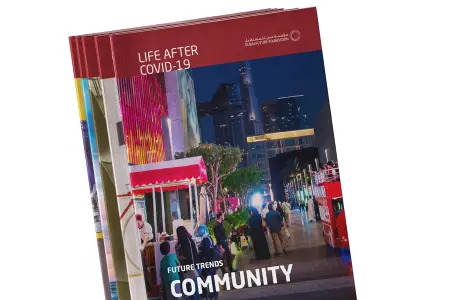PHOTO
- Support for isolated senior citizens and people of determination is particularly critical to ensure an inclusive, safe community
- The shift to digital communications is key to mobilizing the future of community engagement
Dubai - Dubai Future Foundation (DFF) launched its latest report titled, ‘Life After COVID-19: Community’, that highlights the impact of social distancing on societies. Although crucial for slowing the spread of the novel coronavirus, social distancing has increased anxiety and mental health issues among individuals, and led to disruption in family dynamics as family members try to balance social life and work, the report recounts.
The report, launched within the Foundation’s ‘Life after COVID-19’ series, which encompasses six reports till date, tackles the different challenges that the UAE and the Arab world will face in the aftermath of the global health crisis. It addresses the ongoing COVID-19 response measures at the community level, and provides recommendations to support the elderly and people of determination to ensure their safety and social security, as most vulnerable groups of society.
As with previous pandemics, social distancing, or more literally explained as physical distancing, is seen to be the most successful measure in most countries in the absence of a vaccine or treatment for the COVID-19 disease. As a result, all activities that require gatherings have come to a pause and the commercial activity, work and study, which are dependent on the use of the Internet, has further led to a rapid increase in video conferencing platforms.
In fact, the report identifies that active users of the application Zoom, reached 2.22 million people per month during the past few months - more than the total of its users in all of 2019. Primarily used for work, these platforms are now being used to host virtual birthday parties and events.
The report goes on to highlight that COVID-19 isolation has altered everyday lifestyle, and highlights the importance for family members to find a healthy work-life balance, as well as best ways to help children study at home.
Amid COVID-19 lockdowns, the report considers the shift towards digital communications as key to enhancing the possibilities of future community engagement. It draws on the example of the Arab region, where people have increased communication through social media platforms and applications, such as WhatsApp and TikTok, and these platforms have been used to counter misleading information. To elucidate, TikTok, widely used by millennials, is said to have partnered with UNICEF MENA and the World Heath Organization (WHO) to provide verified messages about COVID-19 to the region.
The WHO also used Facebook Messenger, the messaging app and platform, to confront false information about the coronavirus, and the organization expects that about 2.4 billion people will benefit from this information. In regions most affected by the virus, the organization has seen an increase in the use of messages on social media platforms by more than 50 percent. The report also showed that several psychologists and therapists in the region and the world are agreeing to create free virtual support groups, a space where people share their concerns and interests.
Furthermore, while many couples have taken advantage of home isolation to enhance their relationships, this has also led to higher rates of familial issues and divorce rates in some societies. Domestic violence and emotional abuse have also increased as people have been forced to stay indoors in tense environments. The report cites United Nations Special Reporter on violence against women, Dubravka Šimonovic, who stated that it is very likely that rates of domestic violence will increase. She has expressed particular concerns about women at higher risk of domestic violence, and that the situation worsens considerably in cases of isolation such as the lockdowns imposed during the Covid-19 pandemic.
Despite the challenges, the report states that COVID-19 has provided an opportunity to reassess family priorities by recovering "lost times" and spending them with children and the elderly. Those who, before the pandemic, had been busy with their phones during their family meetings, would appreciate the opportunity to spend "real time" with their loved ones.
During the COVID-19 outbreak, the report predicts that caregivers and midwives will have a greater role in domestic healthcare, especially senior citizens and pregnant women. For the long-term, the report also foretells that online sessions and live support groups will continue to grow after the COVID-19 pandemic,
as it allows the formation of new, more inclusive communities that enable people to engage with each other positively without mobility or monetary challenges.
-Ends-
© Press Release 2020
Disclaimer: The contents of this press release was provided from an external third party provider. This website is not responsible for, and does not control, such external content. This content is provided on an “as is” and “as available” basis and has not been edited in any way. Neither this website nor our affiliates guarantee the accuracy of or endorse the views or opinions expressed in this press release.
The press release is provided for informational purposes only. The content does not provide tax, legal or investment advice or opinion regarding the suitability, value or profitability of any particular security, portfolio or investment strategy. Neither this website nor our affiliates shall be liable for any errors or inaccuracies in the content, or for any actions taken by you in reliance thereon. You expressly agree that your use of the information within this article is at your sole risk.
To the fullest extent permitted by applicable law, this website, its parent company, its subsidiaries, its affiliates and the respective shareholders, directors, officers, employees, agents, advertisers, content providers and licensors will not be liable (jointly or severally) to you for any direct, indirect, consequential, special, incidental, punitive or exemplary damages, including without limitation, lost profits, lost savings and lost revenues, whether in negligence, tort, contract or any other theory of liability, even if the parties have been advised of the possibility or could have foreseen any such damages.




















